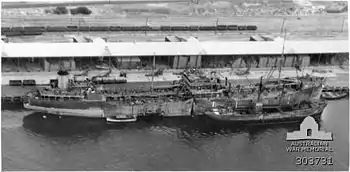MV Ondina
MV Ondina was a 9,070 GRT oil tanker built in 1939 and owned by Royal Dutch Shell; initially operated by the La Corona shipping company. In November 1942, during the Second World War, it was attacked in the Indian Ocean by two Japanese commerce raiders, one of which (the Hokoku Maru) was sunk possibly by a shell fired by the Ondina. After the war it continued operating until decommissioned and broken up in 1959.
 Aerial starboard side view of the Ondina in 1943 | |
| History | |
|---|---|
| Netherlands | |
| Name: | 1939: Ondina |
| Owner: | Royal Dutch Shell |
| Builder: | NDSM, Amsterdam, Netherlands |
| Launched: | 29 April 1939 |
| Completed: | 1 August 1939 |
| Fate: | Broken up at Hong Kong, 1959 |
| General characteristics | |
| Type: | Oil tanker |
| Tonnage: | 9,070 GT |
| Length: | 130.49 m |
| Beam: | 16.62 m |
| Draught: | 6.40 m |
| Propulsion: |
|
| Notes: | 12 knots |
Description
Displacing 9,070 GT, Ondina was 130.49 metres (428.1 ft) long with a beam of 16.62 metres (54.5 ft). The vessel had a draught of 6.4 metres (21 ft). Fitted with a single Werkspoor six-cylinder diesel engine that was capable of generating 2,800 hp, the ship had a top speed of 12 knots. Its armament consisted of a single 102 mm quick-firing gun and several machine guns.[1]
Career
Launched in April 1939, Ondina was built at the NDSM shipyard in Amsterdam, in the Netherlands. Completed in August 1939, prior to the Second World War the vessel sailed for La Corona, a subsidiary of the Royal Dutch Shell company.[1]
Second World War
In November 1942, Ondina took part in the battle against the Japanese auxiliary cruisers and raiders Aikoku Maru and Hokoku Maru where it was damaged;[2] after which it was temporarily repaired and then sent to Exmouth Gulf in Western Australia where she was stationed from 22 June 1943[3] supplying fuel to US submarines.[4] On 1 September 1943 the Ondina also supplied fuel to the ship MV Krait then taking part in Operation Jaywick, the raid on Singapore.[4] At the end of 1943 the ship was sent to the US for repairs at Tampa, sailing via Melbourne, Balboa, Panama Canal and Galveston.[5]
Action against Japanese raiders
On 11 November 1942, Ondina was sailing escorted by HMIS Bengal, a Bathurst class corvette,[1] to the southwest of Cocos Islands in the Indian Ocean, when the Japanese commerce raiders Aikoku Maru and Hōkoku Maru attacked them. The Japanese ships were each armed with eight 5.5-inch guns, while Ondina had only a 102 mm gun and Bengal a single 3-inch weapon. Both Allied ships scored hits in the Hōkoku Maru which blew up and sank; the other raider escaped.[1] Ondina was so damaged in the action that the captain ordered "abandon ship" after which he died. With the tanker's crew in lifeboats, the Japanese killed some with machine gun fire, rescued the majority of the crew of their sunken companion, and retired. Ondina did not sink, so its crew reboarded, repaired some of the damage,[6] and reached port safely.[7]
See also
References
Notes
- Visser, Jan (1999–2000). "The Ondina Story". Forgotten Campaign: The Dutch East Indies Campaign 1941–1942. Archived from the original on 2011-03-21.
- Marcus, Alex. DEMS? What's DEMS?. pp. 118–119.
- "The Potshot (Exmouth) Secret Base: The Artillery Presence" (PDF) (Artillery WA, 3/04, s. 13). October 2004. Archived (PDF) from the original on 26 February 2015. Retrieved 31 May 2015. Cite journal requires
|journal=(help) - Marcus, Alex. DEMS? What's DEMS?. p. 119.
- Marcus, Alex. DEMS? What's DEMS?. p. 120.
- "The Ondina battle". www.netherlandsnavy.nl. Retrieved 2019-07-01.
- Kindell, Don. "Indian Ocean & South East Asia, including Burma". Campaign Summaries of World War 2. Naval History. Archived from the original on 24 August 2015. Retrieved 31 May 2015.
- Helder, Kees. "Ondina (1)". helderline.nl. Archived from the original on 1 June 2015. Retrieved 31 May 2015.
Bibliography
- Marcus, Alex (1986). "DEMS? What's DEMS?": The Story of the Men of the Royal Australian Navy Who Manned Defensively Equipped Merchant Ships During World War II. Brisbane, Queensland: Boolarong Pub. ISBN 978-0-86439-012-7.
External links
- Goossens, Reuben. "The MS Ondina Story – 1942 WWII encounter off the Western Australian Coast". ssMaritime. Retrieved 31 May 2015.